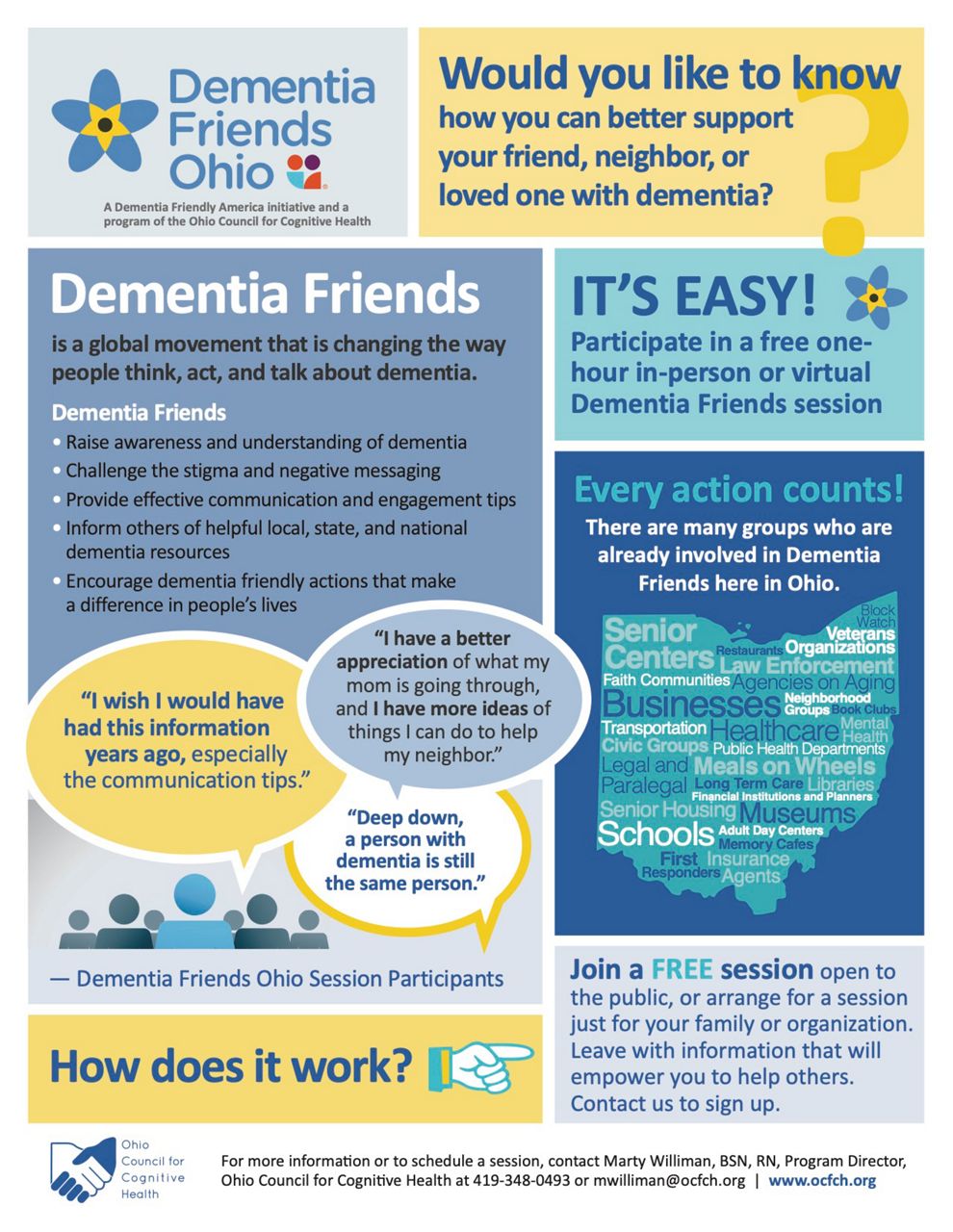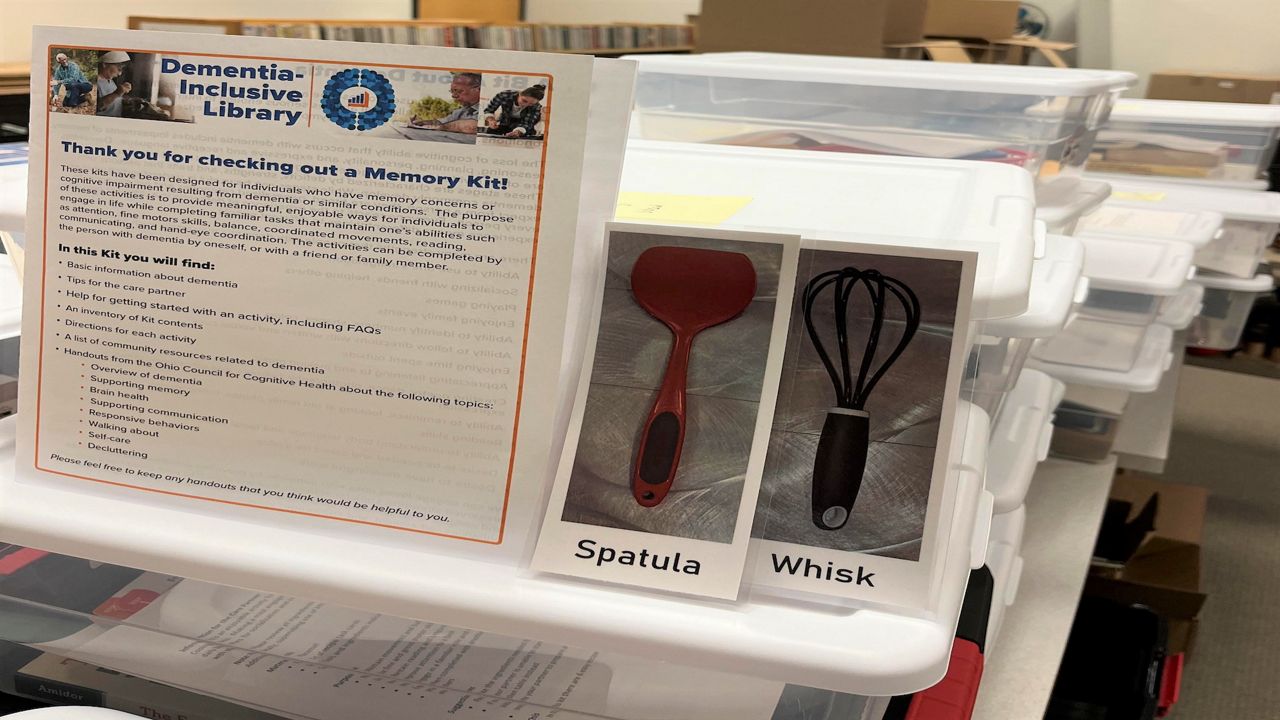AKRON, Ohio — A dementia diagnosis doesn’t have to mean loved ones should be removed from their lives or kept from doing activities they loved in the day-to-day.
That’s the reasoning behind the Akron-Summit County Public Library and its partners opening the new Dementia-Inclusive Library.
The Dementia-Inclusive Library isn’t a new way to fight cognitive decline — it’s an approach to living with dementia in ways that allow continued participation in life.
“The ultimate goal of this is to remove that stigma and fear around a dementia diagnosis and to really support the idea that for much of the dementia journey it is possible to live well,” said Barbara White, the Akron-Summit Library’s deputy director.
Research shows few families will be untouched by dementia. About 12% of Ohioans over the age of 45 have experienced deterioration of thinking, understanding, learning and remembering, according to a recent study by the Ohio Department of Health.
Currently, 220,000 Ohioans 65 and older are living with Alzheimer's, one of several kinds of dementia, according to the Alzheimer’s Disease and Dementia task force of the Ohio Department of Aging.
To better serve aging adults, the Akron-Summit County library has worked with Direction Home Akron Canton, a nonprofit focused on older adults, and the Ohio Council for Cognitive Health, to collect a series of tools for people with dementia and their caregivers to use while at the library. They’ve also developed memory kits for people to check out for home use or to take into congregate living environments to help family members.
“Remaining active and engaged in the things that gave you pleasure, or just for your life's work is critical to being able to live abundantly,” White said. “You can continue to live well and if you're a care partner, there are ways you can continue to communicate and find moments of joy."
All Akron-Summit County librarians are now trained “Dementia Friends,” which is a national movement to remove the dementia stigma and offer tools for support. More than 100,000 people across the country are certified Dementia Friends, White said, with about 6,000 certified in Ohio.

Librarians will receive refresher courses each year, along with refreshers in sensory-inclusive training, which supports those who struggle with lights, sounds, motion and other stimulators, she said. The library became sensory-inclusive certified across all 19 branches in 2018.
“That gives our staff information that they can use, strategies they can use with customers, loved ones, neighbors, to help them and support them,” White said.
Among the dementia library’s offerings is a series of downloadable PDFs from the cognitive health council with tips ranging from communication to walking about, which is when a person with dementia wanders, sometimes out of the house.
A series of videos is also available with how-to guides for making memory books, understanding behaviors and decluttering your home.
Coming this month is a series of memory kits that can be checked out like books, White said. The kits were designed by librarians working in conjunction with Brush Development Co., a training agency with a Montessori approach to elder care.
The kits cover a ream of subjects many older adults would have enjoyed before cognitive decline set in, from activity in the kitchen and working with tools to gardening and enjoying the night sky.
“They're all very different and I think we are confident in saying that ours are going to be very different from what other libraries have,” White said.
The kits are designed to take users through all the stages of dementia, and can help the person feel a sense of control by knowing what’s supposed to happen and how they can engage with it, White said.
The library is planned to grow, with new kits and additional resources added and plans are in place to offer tools throughout the library to help people with dementia, such as at check-out areas, she said.
“So somebody comes in, and they know they have to give you something when they come to check out but they can't think of the word and they're getting flustered,” she said. “There's maybe some cards on a ring that they can go through, and they can point to the one that’s a library card.”
Librarians will also be going out into the community to share information on the Dementia-Inclusive Library and the memory kits, as well as on Dementia Friends training, White said. They plan to speak to businesses and nonprofits anywhere they can.
“We're going to be listening to people in facilities when they tell us the kinds of encounters and engagement they want to have, and with government entities and with people in business,” White said. “How do we support this in every way that we can, to the extent that we can, given that we're a library? What are the kinds of things we can do, even if it's just connecting people?”
The library’s dementia-inclusive work aligns with the Age Friendly initiative the city and county launched in 2019 in conjunction with AARP.
Projections show seniors will make up more than 30% of Summit County’s population by 2030. To earn the Age Friendly designation, the city and county are working to show steps have been taken to make the area a place people of all ages, income levels and abilities are able to thrive.



